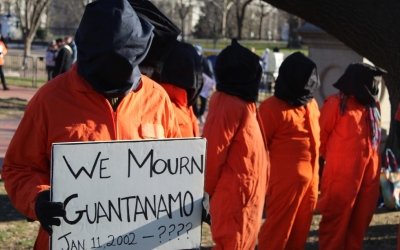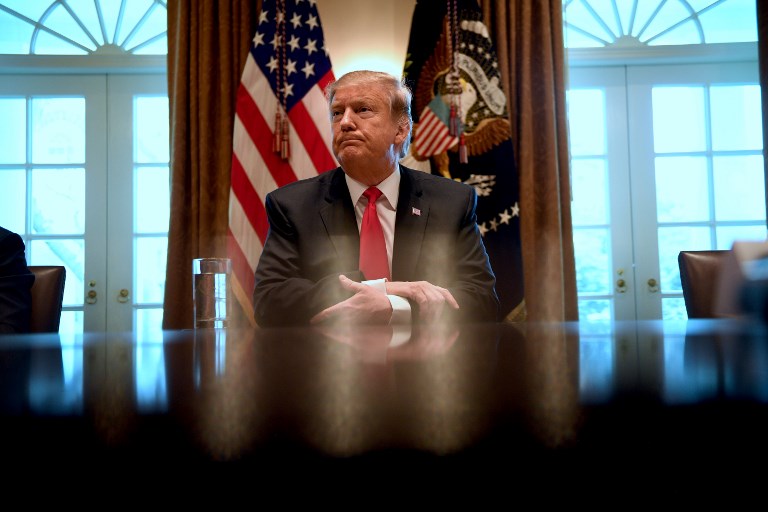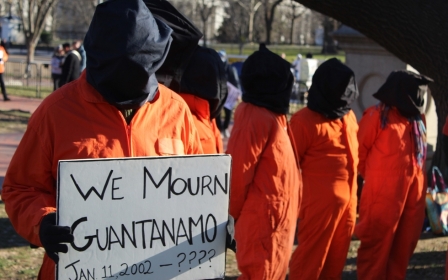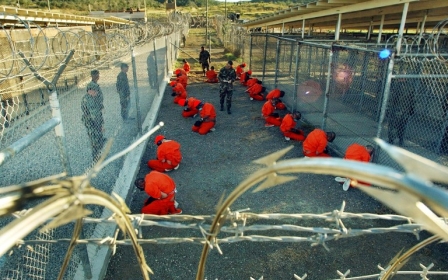Guantanamo sees new construction a decade after prison ordered shut
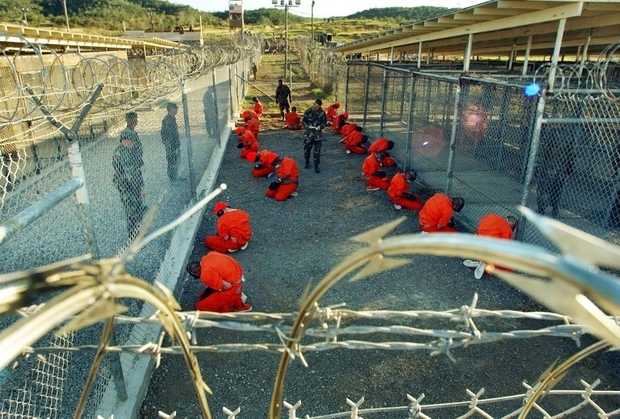
A worn, yellow Bobcat excavator barrels over the defunct, 1940s-era McCalla Airfield, now the home of a maximum-security courthouse at Guantanamo Bay's Camp Justice.
The machine is bringing in materials needed for the expansion of offices and a new holding cell adjacent to the courthouse. The medically equipped cell will allow prisoners to live at the Camp Justice section of Guantanamo during court proceedings for the first time.
It has been 10 years since former US President Barack Obama issued an executive order to close the prison facility in Guantanamo Bay, Cuba.
However, not only has US President Donald Trump been determined to keep the camp open, his administration is now expanding it.
The site outside the courthouse at Camp Justice is one of several across the base showing signs of construction. Fenced off, the areas are marked with signs that read, "Construction Site: Unauthorized Entry", in red letters.
New MEE newsletter: Jerusalem Dispatch
Sign up to get the latest insights and analysis on Israel-Palestine, alongside Turkey Unpacked and other MEE newsletters
Last month, the Miami Herald published documents from the US Army's Contracting Command that showed the prison administration was seeking to "identify potential contractors" for a new 5,000-square-foot prison compound at the base.
The compound, to be built at an as yet undisclosed location, will include three handicapped-accessible prison cells and several other incarceration enhancements.
While officials have refused to comment on why the new compound is needed, the handicapped requirements listed in the contract request indicate that the prison administration may be preparing for the possibility of much longer stays for detainees already in their 50s and 60s.
Asked about the new cell being built outside the courtroom, a spokesman for the Office of Military Commissions (OMC) said the expansion aims - at least in part - to address the failing health of older prisoners.
"Facing an ageing detainee population, along with the legal teams' request for additional space, OMC has offered [the new holding cell], as a larger, secure meeting area," Lieutenant Jason Tross told MEE in an emailed statement.
The new construction is just one of the uncertainties surrounding the 17-year-old prison.
While Obama's order to shutter operations at Guantanamo was stalled in Congress throughout most of his two-term presidency, Trump issued a counter-executive order in January 2018, declaring that closing the prison camp was a non-starter for his administration.
As recently as January, Trump said moving more prisoners to Guantanamo is still an option. Several GOP legislators have backed that proposal, calling for Islamic State group (IS) fighters to be transferred to the island.
The last time a new prisoner arrived at the base was in 2008, when the prison still held about 280 people. Today, 40 prisoners remain, only one of whom has been convicted of a crime.
Eight others are currently going through military court proceedings. Of those, five are alleged 9/11 plotters who have been charged in a joint death penalty case.
The Military Commission
Prisoners at Guantanamo who are charged with crimes go through a military court known as the Military Commission.
Military commissions have been set up throughout US history to try individuals for "unlawful conduct associated with war".
The Military Commission at Guantanamo is considered to be the biggest such criminal trial in US history. Established in 2006, the commission has moved along at a notoriously slow pace and defence attorneys for those held at Guantanamo have continuously complained of government overreach.
They say military officials on base have read their mail and installed monitoring devices in attorney-client meeting rooms.
Andrew Gordon, a law professor at Arizona State University who served as counsel to the US Department of Homeland Security between April 2009 and October 2010, told MEE that the military commission has been far from effective.
"They have been extremely slow and produced little by way of results," Gordon said, adding that he believes the detainees who are "subject to prosecution" should be tried under the US's federal court system, instead of through the commission.
On Tuesday, the pre-trial for Abd al-Hadi al-Iraqi, the nom de guerre of Nashwan Abdulrazaq Abdulbaqi, resumed hearings.
Hadi, an alleged high-level member of al-Qaeda, is likely part of the reason for the new handicapped cell being built off the courtroom. He suffers from degenerative disc disease and it is painful to travel to court daily from Camp 7, the top-secret facility where he and 14 others are imprisoned.
'The timeframe alone flies in the face of one of the fundamental pillars of the rule of law ... the men accused of being directly involved in 9/11 are still in the pre-trial hearing phases, 17 years on'
- Katie Taylor, deputy director of Reprieve
Hadi is one of the eight prisoners at Guantanamo who has been charged, though those charges are listed under crimes of war, not terrorism. He has been held at Guantanamo Bay since 2007, with the pre-trial proceedings only beginning in November 2018.
Katie Taylor, deputy director at Reprieve, a legal charity that represents eight prisoners at Guantanamo, told MEE that "it's hard to imagine a less efficient - or less just - form of 'justice' system than [the trials] have proven to be".
"The timeframe alone flies in the face of one of the fundamental pillars of the rule of law, which is that proceedings must happen in a timely manner. The men accused of being directly involved in 9/11 are still in the pre-trial hearing phases, 17 years on," Taylor said.
"More broadly, the military commissions have been riddled with problems that call into question whether they could any meet any sort of fair trial standard, particularly in light of the unbelievable torture the US practised on the defendants."
'Forever prisoners'
In addition to the eight people being prosecuted under the military commission, 26 others are being detained without charge or trial at Guantanamo, earning them the name “forever prisoners".
Five more were cleared of any wrongdoing by six federal agencies and were ordered released near the end of Obama's second term, but they are still being held at the facility.
At the time they were ordered let go, the parole-style boards at the prison were unable to finalise the procedures for their release from Guantanamo before Trump froze the Obama-era mechanism to discharge prisoners.
A Reprieve report released in January found that the review board's policies - a host of different non-legal standards set up to evaluate whether a detainee may be released - has created a "rigged" system.
Today, while the review board can make a suggestion, the ultimate decision for release lies with the US president - and Trump himself has publicly said "there should be no further releases" from Guantanamo.
“[The system], as it currently operates, fails to meet any standards of independence and impartiality and instead acts as a conduit for decisions which ultimately lie with the executive branch," Reprieve said in its report.
"It is incredibly flawed," Taylor added.
The only prisoner who has been released under the Trump administration is Ahmed al-Darbi, who was cleared for release before the president took office.
Al-Darbi, a convicted al-Qaeda operative, was imprisoned at Guantanamo for 15 years before being transferred in mid-2018 to the custody of Saudi Arabia for the remaining nine years of his sentence.
Gordon told MEE that he could not see a justification for ignoring decisions made by the review boards, other than the Trump administration's own "political theatre".
"[The detainees] are just puppets in the story he wants to tell," Gordon said.
"The continued retention of detainees in Guantanamo is bad public policy and absurdly and unjustifiably expensive. However, Trump isn't spending his money, he's spending the public's money so he's indifferent to cost."
Each prisoner at Guantanamo Bay costs the US around $11m a year, according to Human Rights First, a non-profit group based in the US.
Torture 'works', Trump said
Trump has made it clear that he sees value in both the prison and the controversial practice of torture that made headlines during George W Bush's presidency.
In 2009, a week before Obama issued the executive order to close the prison, the US for the first time admitted its use of torture as an interrogation tool, something human rights groups and the United Nations had accused the US of practising at Guantanamo Bay for years.
The height of those accusations occurred in 2004, when horrifying photos of torture and humiliation were leaked from Abu Ghraib Prison in Iraq, another US-run site used to hold prisoners during the US invasion of Iraq.
A tale of government-sanctioned torture was revealed, implicating American allies including British intelligence agency M15, and making questions about what was really going on at the Guantanamo facility even more pressing to answer.
While report after report, including some from the US government's own intelligence apparatus, have declared torture an unreliable means of information gathering, US President Trump has endorsed the use of torture on “terror suspects” on multiple occasions.
Days before assuming office in January 2017, Trump said about waterboarding and other methods of torture: "Absolutely I feel it works."
A year later, Nils Melzer, the United Nations' special rapporteur on torture, warned that he had seen reports indicating that forms of torture continue to be in practice at Guantanamo.
Melzer said that reports he received indicated that "noise and vibrations" were still being used at the prison, causing the detainees to experience "constant sleep deprivation and related physical and mental disorders".
At the time, Melzer said Washington should allow internationally recognised experts to independently verify those reports by visiting Guantanamo, a request the US has continuously denied.
'Institution itself is torturous'
Benjamin G Davis, a law professor who heads the University of Toledo's military commission observer programme, has been visiting the base since 2013.
Davis said that while he and other observers do not have access to much of the base, so he said he can't say for sure, he doesn't think torture is taking place at the prison today. Still, that doesn't mean torture hasn't ever taken place there.
'There are people who were tortured at Guantanamo ... the consequences of that torture lives on in them today'
- Benjamin G Davis, University of Toledo law professor
"I do know there are people who were tortured at Guantanamo, whether through enhanced interrogation techniques or detention rules. The consequences of that torture lives on in them today," he said.
Davis said he was especially "troubled by the force-feeding", a practice that began at the facility in 2006 to combat hunger strikes among the detainees.
The UN has suggested that indefinite detention with no prospect of release could in fact amount to torture, Reprieve's Taylor pointed out. "The very institution itself is torturous," she said.
Yet in parts of the 45-square-mile base that are accessible to civilians, there is little indication of the indefinite detentions, wiretapping or "enhanced interrogation" that have been documented at the compound.
The well-paved roads that weave around the sandy facility offer an estimated 6,000 residents access to a bowling alley, miniature golf course, pool, movie theatre, beaches, state-of-the-art gym, children's playground and a tennis court, as well as a variety of restaurants, including three Subways and a McDonald's.
Meanwhile, 40 men - many of whom have been detained for nearly two decades - continue to languish in cells.
Middle East Eye delivers independent and unrivalled coverage and analysis of the Middle East, North Africa and beyond. To learn more about republishing this content and the associated fees, please fill out this form. More about MEE can be found here.


